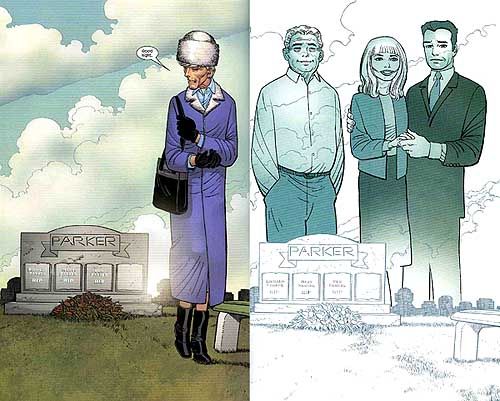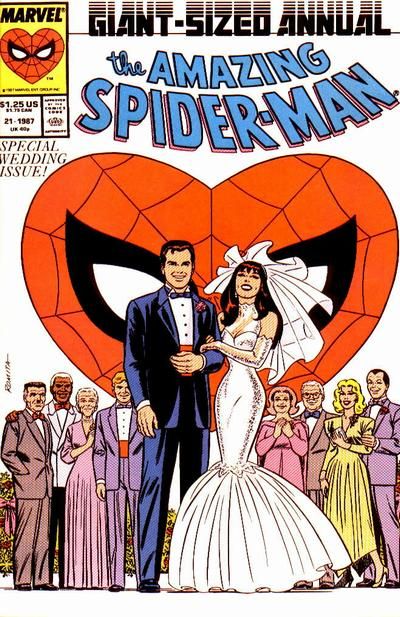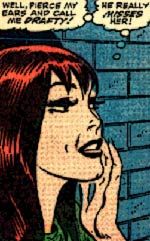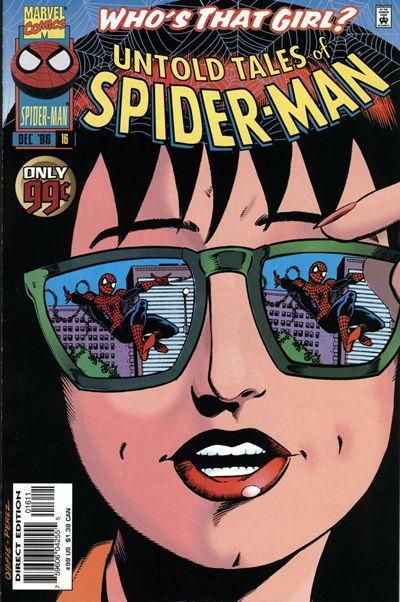Ohhhh Boy. These here are some dangerous waters to be splashing around in.
I understand that some of you really, REALLY like Mary Jane Watson and Peter "Spider-man" Parker being married.
It's sweet.
The circumstances in comics that immediately led up to the marriage might have been a tad contrived, but the marriage itself totally makes sense in terms of overall character progression and Peter/Mary Jane's shared history.
It gives Spidey an emotional anchor.
The every-nerd gets girl premise is even kind of validating for many of you.
And, OK, me too.
But.... Let's try to be all Zen-like and analytical about this. Inhale. Exhale. Think of happy clouds.
Let's forget, for the sake of argument, certain clumsy developments in the actual telling of Spider-man stories, and look at the marriage as an isolated thing.
Everybody forgot? Goot, goot.
Let me posit the following premise: Every superhero worth his spandex is a vehicle for certain unique types of stories. Specific superhero comics ain't just about the personality, powers or supporting cast of the main character. Each book is also a specific milieu designed for telling certain TYPES of stories that reflect certain themes. A dark, noir-ish, revenge driven story will generally serve Batman better than Superman, unless it thematically incorporates or comments on elements of The Superman Story, such as the immigrant myth, American optimism, or the stark division between right and wrong.
What I'm talking about here isn't exactly the same thing as a Story-telling engine, but it hangs out in center field of the same ball-park.
But note that when I say "Spider-man" in the body of this post I'm usually going to mean {The entirety of the "world" as it's generally depicted in the Spider-man comic book} or {Spider-man as grouping of concepts centering around the themes of power and responsibility, private duty vs. public perception, personal isolation, family, and stuff like that.}
So. Marriage bad. Two points.
(A) {Spider-man} is designed to incorporate soap opera elements.
Here's my theory: The reason super-hero comics survived and prospered when westerns and pirate comics flopped over and died was the super-folks adaptability, the ease with which they utilize the conventions of different genres.
Companies didn't stop making crime comics, romances, horror stories or science fiction comics. It's just that the tropes of those genres got incorporated into superhero comics.
So let's look at the non-super-hero genre elements that went into Spider-man. In it's earliest Ditko days, Spider-man was part crime comic, part Frankenstein story (Think of it as mad scientists at war) and part romance comic, mebbe 20% Archie style comedy mixed with 80% straight tear-dripping romance.
And the central question of romance comics, Archie style and regular, is who's gonna hook up with who.
So if you marry the two leads this becomes a moot point. In the Spider-man-verse, the marriage has two effects -
First, despite some brilliant wrangling from folks like Paul Jenkins**, the marriage did often take the focus off Pete's brilliantly conceived supporting cast, and second...
Peter's constant girl troubles were a darn fine way to maintain narrative tension. You take that away, and you need a hook to replace it. And there hasn't been one for the last twenty-or-so years that drive the narrative so effectively.
Now, don't get me wrong. There are some storytelling advantages to having a married Spider-man. It does somewhat increase the tension of having Mary Jane threatened (See that first Micheline/Mcfarlane Venom story) and it increases the importance of family in the title, which let J.M. DeMatteis and Sal Buscema to draw some interesting parallels in their Spectacular (note clever pun) Death of Harry Osborn arc. But neither of those has been able to CONSISTENTLY provide the illusion of story advancement which ongoing collectively written stories need to keep chuggin' along.
This also doesn't mean that no elements can be introduced that are as interesting as the soap opera based engine. I can't think of any, mind. But I grantya the theoretical possibility.
Which brings me to my second and more damning point:
2) Spider-man is Coming of Age Story:
In fact, Spider-man is fighting it out with Huck Finn and Harry Potter to be THE most important coming of age story in Western culture. Check it:
"With Great Power Comes Great Responsibility", right?
Growing up means gaining more power and gaining more responsibility. Pete/Spidey starts as a powerless teenage aunty's boy. Then, in his very first story, he's taught the importance of social responsibility, and he has to struggle to apply his new-found more grown-p perspective to his real life.
"I WANT to punch Flash Thompson in the cajones, but doing so might reveal my secret identity and endanger ALL the people around me. So I won't. Dammit."
Responsibility.
I don't think I'm too far off in saying the purpose of Spider-man is to teach us how to be grown-ups.
So when Spider-man undergoes maybe THE most important ritual of becoming an adult***, he's no longer coming of age, he dang well CAME.
Which would be a heck of an ending to the Spider-man story. If we want to permanently replace Peter with May Parker/Spider-girl, this is the way to go about it, happily ending the Spider-man story. (And I'm certainly not opposed to this course of action.)
OR if we want to re-cast Spider-man as a coming to middle-age story with a house in the 'burbs and a kid not abducted by the Green Goblin and vanished forever... well that maybe possibly kinda might work sorta to a degree if the creative team involved was stellar.
Maybe.
Still, even if reversing the marriage is a good thing it's going to be tough to tell this story well.
I think I can safely submit One More Day so far for evidence.
I certainly can't think of an effective, in continuity, {Spider-man} appropriate way to end it. Divorce just makes Spider-man look old. Killing Mary Jane gets rid of one of the best supporting characters in comics. Having the devil come in and use Super Devil Magic... Well, that's just stewpid. THAT would never happen, right?
Right?
So we're stuck with the theoretical - Single Spider-man and Mary Jane WORK in a way that married Spider-man doesn't. Versus the practical - Making married Spider-man fun is a storytelling quagmire.
And, honestly, it's kind of a damned both ways situation. I guess I'm more anti-marriage. It certainly hasn't destroyed the comic or made for terrible stories - Although I'd argue that Spidey's Golden Age had passed by '87 - But it still feels like married Spider-man isn't working how he's supposed to work .
And maintaining Spider-man as vehicle for stories and, more importantly, Spider-man as cultural icon is, to my mind, the most important thing.
* By which I mean 1947.
** Bring back Kevin the Cheese!
** Note "Ritual." As in "On a ritual level." As in married people SEEM like adults in society's eyes, whether or not they ACT like adults. Figured I had to make that distinction or lose all my cred among anyone who's ever met Newlyweds.




